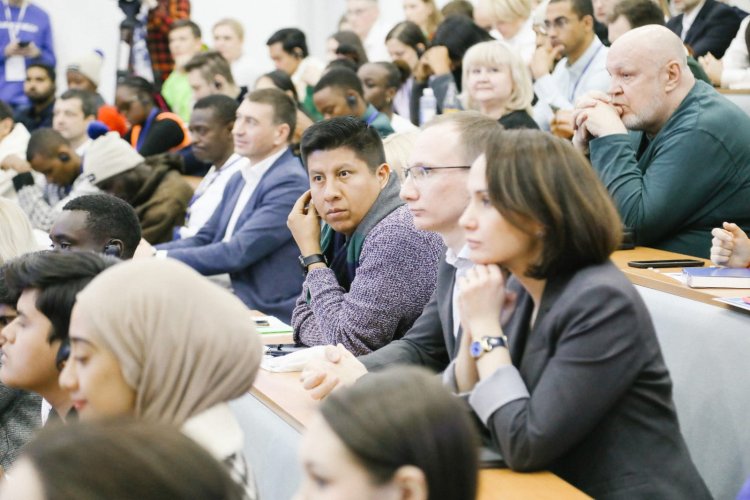Egypt's Key Spokesperson at the Regional Program of the World Youth Festival in Russia

Ghazaly: Professor Ashraf Sobhi Agreed to Launch the Global South Youth Bureau to Develop South-South Relations
Ghazaly: The World Youth Festival's Theme about Family Aligns with Egyptian Family Concepts
Ghazaly: The New Generation Should Not Lose Its Historical Depth Due to Globalization
Hassan Ghazaly, the founder of the Global South Youth Bureau and the Nasser Youth Movement and Fellowship, participated as a keynote speaker at the regional program organized by Russia on the sidelines of the World Youth Festival. This occurred during a meeting between the governor of the Yugra region, Natalia Komarova, and participants of the World Youth Festival, as well as winners of the comprehensive Russian management competition titled "Leaders of Russia" and the "Strong Ideas for a New Era" forum, held this March.

During his speech, Ghazaly addressed several important topics, notably discussing the historical depth of Egyptian-Russian relations, the level and future of cooperation between Egypt and Russia in various sectors, and the historical depth of African-Russian relations. Additionally, he provided an anthropological-diplomatic perspective on the Russian people and youth, along with his experience at the World Youth Forum in Russia and his vision for the festival's role in supporting the future of international relations on a global scale.
At the beginning of his speech, Ghazaly praised Russian women for their high level of professionalism and flexibility, describing them as a true model of working women. He also highlighted the kindness of the Russian people and their warm hospitality towards festival guests, expressing gratitude for his deep human experience with the Russian people, which made him feel as though he was among his own family. He noted the flexibility of Russian people of all ages, including elderly women, who demonstrated high levels of cooperation and kindness, reminiscent of his own mother.

Reflecting on his experience in Russia during the festival, Ghazaly commended the idea and philosophy of the field visits organized by the festival committee, providing participants with the opportunity to meet indigenous populations. He admired this experience, which allowed him genuine personal interactions with indigenous people in various regions. He viewed it as a form of empowerment for local populations to express their identities and cultural heritage, supporting their representation before different nationalities. This stood in stark contrast to the selective application of human rights issues by some Western countries, who themselves have not always treated their indigenous populations fairly.
Ghazaly emphasized that the World Youth Festival in Russia presents a significant opportunity to achieve integration, cooperation, and solidarity among global youth on regional and international peace issues, enhancing international cooperation and understanding among nations, particularly through initiatives and projects fostering collaboration and exchange between Egyptian provinces and Russian regions in similar fields.

He further highlighted the festival's important themes of multipolar unity and responsibility towards the world's fate, as well as its message about reviving the family for the sake of future generations, He emphasized the festival's role in uniting youth from various levels, including regional Russian youth, allowing them to meet on a single platform, exchange opinions and experiences on various issues, and familiarize themselves with their country's historical role in confronting and defeating Nazi forces.
On another note, Ghazaly praised the depth of Egyptian-Russian relations at the presidential and political leadership levels, especially in terms of youth ministers on both sides. He conveyed greetings from Minister of Youth and Sports Professor Ashraf Sobhi to the participating youth, emphasizing that the festival is an opportunity to build friendships and real experiences. He also mentioned that the Egyptian Ministry of Youth and Sports is working on sustaining the Egyptian-Russian Youth Forum as part of Bublic diplomacy.
Ghazaly stated that Professor Ashraf Sobhi, Minister of Youth and Sports, had agreed to enhance the role of the African Youth Bureau to become the Global South Youth Bureau to communicate with the countries of the Global South, in line with Egypt's directions, especially regarding South-South cooperation, highlighted by Egypt's joining of BRICS.
He explained how the Russian Federation has been a strong strategic ally and supporter of Egypt during its struggle against colonialism, citing Russia's support for Egypt in infrastructure and national projects like the High Dam during the era of the late leader Gamal Abdel Nasser. He also mentioned the recent significant development in Egyptian-Russian relations, particularly regarding cultural and student exchanges, such as the Egyptian-Russian Youth Forum organized in both countries recently.
In a related context, Ghazaly praised the depth of African-Russian relations and the genuine friendship represented by Cairo and Moscow as supporting forces for all peoples seeking liberation in the Global South. He highlighted the pivotal role played by the Soviet Union in supporting national liberation movements in Africa by providing various forms of support, whether political, logistical, or military, as well as its role in activating international support and solidarity with national movements through work in international organizations like the United Nations to support the rights of peoples in determining their own destiny.
